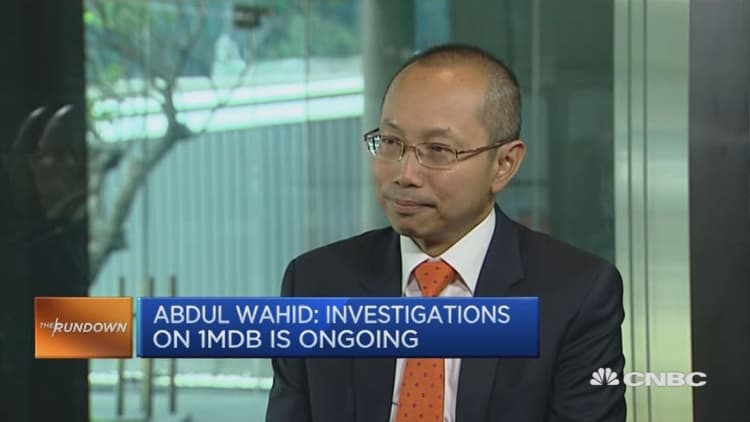
The financial structure of Malaysian state investment vehicle One Malaysia Development Berhad (1MDB) was unsustainable from the very start, according to a top government minister.
1MDB's design was an exception, not the norm, for Malaysian government-linked companies, Abdul Wahid Omar, Economic Planning Minister of Malaysia, told CNBC's "The Rundown" on Monday.
Rather than being listed like other firms, 1MBD, which was set up in 2009, was wholly owned by the Ministry of Finance, he said.
"The model that they took was low capitalization and huge borrowings, and I think as they found out, it wasn't a sustainable model. With that came debt realization, where the board has now embarked on a rationalization plan."
1MDB teetered on the verge of default in 2015 after racking up 42 billion ringgit ($11 billion) in debt in just five years. After missing various deadlines to repay loans to creditor banks, speculation was rife that the company wouldn't be able to service the rest of its obligations. Because the fund is wholly owned by the government, Prime Minister Najib Razak's administration is responsible in the case of a default. At the time, 1MDB was widely considered a serious liability risk for an economy whose finances were already under strained by the oil price crash. Crude oil-related income accounts for 30 percent of Malaysia's government revenues.
A debt rationalization program was launched in May 2015 to reduce 1MDB's burden by selling assets, and in November the beleaguered fund successfully sold its energy assets for $2.3 billion to a Chinese nuclear power supplier.
"The norm [in Malaysia] is successful transformation of the government-linked companies that we've embarked on," Abdul Wahid told CNBC.
He noted high-profile firms, including Maybank, CIMB, Axiata, Telekom Malaysia and Sime Darby, had all gone through this transformation by steadily improving their financial performances and governance and enhancing their role in nation-building.
1MDB's outlook took a new twist in July, after the Wall Street Journal (WSJ) reported that $700 million had been transferred from the fund to the Prime Minister's personal bank accounts back in 2013. Najib has repeatedly denied any wrong-doing. In January, he was cleared by the Malaysian Attorney General after a probe found that the money came from the Saudi royal family.
But the finding has done little to dampen interest in 1MDB's activities, with the fund currently being investigated by local and international officials for alleged corruption and money laundering.
Regarding the scandal surrounding the wealth fund, Abdul Wahid said Malaysian authorities were doing their best to investigate the matter.
"That process is ongoing, including the enquiry by the public accounts committee. This is a parliamentarian committee, comprising of members on both sides of the political divide, the opposition and the government and we should allow this process to continue," he said.
The latest revelations came on Friday, when the WSJ reported that a production firm called Red Granite Pictures, co-founded by Najib's stepson, was used to finance the making of Hollywood feature "The Wolf of Wall Street," using money from 1MDB. But the fund has said it neither invested in nor transferred any money to Red Granite.
Speaking more broadly, the minister said Kuala Lumpur was moving towards fiscal consolidation as it diversified its economy away from energy. Southeast Asia's third-largest economy grew a faster-than-expected 5 percent on-year in 2015, but that was still slower than 2014's rate of 6 percent.
"The bold actions that we've undertaken to reduce our fiscal deficit down to 3.2 percent last year and this year, notwithstanding the lower oil prices, still committing to 3.1 percent. We've broadened our revenue base in terms of the implementation of the goods and services tax [GST], and we've rationalized subsidies," he said.
In a note last month, rating agency Moody's praised the government's fiscal management, but noted that the public debt burden had not yet undergone a material improvement. Earlier this year, Moody's revised its sovereign rating outlook to stable from positive.
"This year, with a more challenging environment, we do expect to grow between 4-4.5 percent and one reason why we're able to grow sustainably is that we've diversified the structure of our economy, where we've reduced dependence on commodities from 27 percent in 1997-98 to 18 percent currently," Abdul Wahid noted.
—Follow CNBC International on Twitter and Facebook.
Correction: This story was revised to correct that The Wall Street Journal reported that $700 million had been transferred from the fund to the prime minister's personal bank accounts in 2013.



